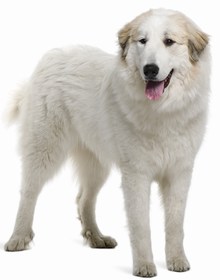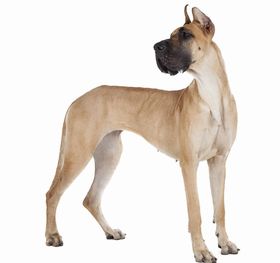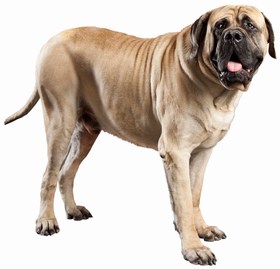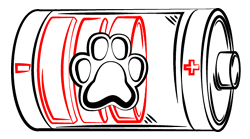
Paws ‘N’ Pups Quickview
Size
| Energy Level
| Trainability
| Paws ‘N’ Pups Rank
|
Characteristics
| Physical Characteristics: Height: 25-32” Weight: 120-180 lbs. Energy Level: Moderate – High | Colors: The Saint Pyrenees is found in the following colors:
|
Health & Longevity
Average Life Span: 8-12 years
Described as the gentle giants of the dog world, the Saint Pyrenees is a mix of a Saint Bernard and a Great Pyrenees. As puppies, these dogs are healthy and lively, but they can develop serious conditions and diseases as they age. Their parent breeds are riddled with health issues because of their large stature. Some of those health issues can be passed down to the Saint Pyrenees, but rarely become prevalent until 3-5 years old.
Seizures
When a Saint Pyrenees suffers a seizure, their body will collapse and spasm. Their eyes will roll, their tongue will loll, and they may foam slightly at the mouth. These are caused by a whole list of conditions, but the most prominent is epilepsy. If you notice your dog lying unresponsive for an extended period of time, or if you have trouble waking your dog, take him to the vet immediately for an evaluation. Strong seizures can be deadly, but prescribed medication can lessen their occurrence.
Heart Disease
This disease is one of the more grave and traumatic issues for Saint Pyrenees dogs. Unfortunately, it is hard to detect early without extensive blood tests, but you can protect your dog with a low-fat, balanced, high-quality diet and plenty of exercise. Symptoms of severe heart disease include a bloated belly, fainting, a bluish tinge to the gums, and unexplained weight loss. Valve replacement is possible to reduce the risk of heart failure, but there is no solid cure for heart disease.
Patellar Luxation
Also known as a “floating kneecap,” this condition occurs when a dog’s kneecaps slide in and out of place. Saint Pyrenees dogs will have a more challenging time with this condition because of their larger size. Symptoms include limping or hopping. If left untreated, it could cause significant arthritis and pain around the knees. Most vets will recommend surgery to fix this condition.
Other health issues that might plague a Saint Pyrenees includes bloat, bone cancer, progressive retinal atrophy, cataracts, and hip dysplasia. Despite their list of possible health problems, Saint Pyrenees dogs have an average lifespan of 8-12 years.
Temperament & Train-ability
Saint Pyrenees dogs are gentle, friendly, and loving. As puppies, they are high-energy canines who love to run and play in a big backyard. Dog parks are especially beneficial to them in the puppy phase. As they get older, Saint Pyrenees dogs prefer the familiar comforts of home and family. They would much prefer to lay on the couch with their loved ones after two years of age. However, despite their laid-back attitude toward exercise after a certain age, you should encourage your Saint Pyrenees to remain active with at least two short walks per day and regular playtime. This is important to maintain their health.
The parent breeds to the Saint Pyrenees are equally as friendly and calm, so their peaceful, sweet demeanor goes back generations. These dogs are somewhat shy and cautious around strangers, but verbal coaxing and encouragement will help them become more affectionate towards new friends.
Saint Pyrenees dogs are highly intelligent but kind and eager to please by nature, so training is a natural process. They have a streak of stubbornness, thanks to their Saint Bernard genetics, but it is easily overcome with clear commands and praise. Be positive and concise in your instructions. Then reward her with treats for good behavior when she successfully complies with your commands.
Saint Pyrenees dogs are easier to train as puppies because they know you and only you as their Alpha. However, if you adopt an adult crossbreed, be strong and persistent in establishing your dominance. Never raise a hand towards your dog to train them. Instead, use encouragement and a strong voice to gain a better handle on their behavior. Adult dogs are harder to train because they are set in their ways. Be determined and patient, and your training will pay off.
Grooming
Great Pyrenees dogs are known for their long, shaggy coats, whereas a Saint Bernard has fuzzy, lengthy hair. Your Saint Pyrenees could have one or a mixture of these coats. She will shed regularly and a lot, so brush her daily to take care of tangles. If she goes too long without a brushing, she could develop mats that lead to bacterial infections.
Bathe your Saint Pyrenees whenever you think she needs it. Twice a month is a good idea, but you could go for as long as one month between baths if you groom her regularly. If you don’t have the space to bathe a Saint Pyrenees, take her to a groomer for a professional bath.
Diet
Saint Pyrenees dogs are very large. Big dogs mean big appetites! Split 5-6 cups of good-quality dry kibble into 2-3 meals per day. She should be satisfied when she gets done eating. If she is begging or searching her food bowl for more after a big meal, ask your vet about increasing her food by ½ a cup.
These crossbreed dogs need a diet high in protein and fiber to feel satisfied. Make sure you read the labels on the dry dog food before you commit to a brand. The main ingredients should begin with meat, followed by whole grains. Try to avoid foods filled with preservatives, chemicals, and by-products.
Looking for a Saint Pyrenees?
 Find A Saint Pyrenees Breeder |  Saint Pyrenees Puppies For Sale |  Adopt A Saint Pyrenees |
Cost
Rare and in high demand, Saint Pyrenees puppies can cost up to $700 from a reputable breeder. If you manage to find one at a shelter, adoption fees start around $450, excluding vaccinations and basic check-ups. If you calculate all of the Saint Pyrenees expenses, you could pay well over $1,000 for food, routine vet visits, toys, de-wormers, and flea prevention.
Paws ‘N’ Pups Ranking
Paws ‘N’ Pups ranks every breed out of 4 with 1 being easiest to integrate into your life and 4 being the toughest – The lower the ranking the better.
Ranking takes into account a few basic factors including cost, skill level needed, high vs low maintenance and how critical regular training is to success. While the Saint Pyrenees is gentle and friendly, they get a 3 on the Paws ‘N’ Pups scale. They are great family pets, but you need plenty of space for such a big dog; their food needs are expensive; and they are prone to serious health issues.
Breeds Similar To Saint Pyrenees
 Saint Bernard |  Great Pyrenees |  Great Dane |  Mastiff |




